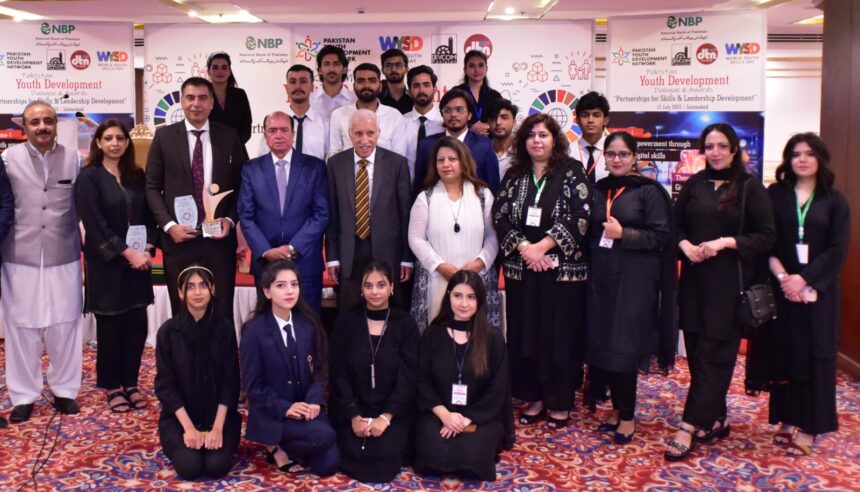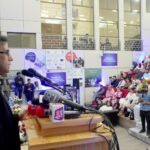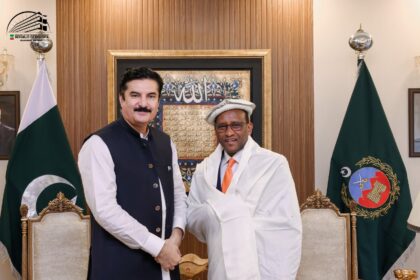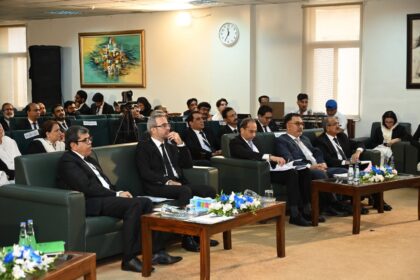**Pakistan Youth Development Dialogue 2025 Emphasizes Youth Empowerment, Digital Skills, and Climate Leadership at National Conference**
At a high-profile gathering marking World Youth Skills Day, the Pakistan Youth Development Dialogue 2025 called for youth empowerment and placed digital skills, inclusive education, and climate leadership at the center of the national development agenda. Organized by the Development Communications Network (Devcom-Pakistan) in Islamabad, the conference brought together policymakers, corporate leaders, representatives of non-governmental organizations, and youth advocates to discuss coordinated initiatives and policies to unlock the potential of Pakistan’s youth.
A key highlight of the event was the official launch of the “Pakistan Youth Development Network,” under the leadership of Devcom-Pakistan’s Executive Director, Munir Ahmed. Speaking at the event, Ahmed stressed the necessity for integrated and comprehensive national platforms to enable young people to access skill-building opportunities, participate in policymaking, and assume leadership roles. He pointed out that over 60% of Pakistan’s population comprises youth, yet many feel excluded from development processes. “We cannot afford to let this demographic dividend turn into a liability. This network aims to serve as a national platform for youth skill development, enhanced participation in policy, and opportunities for leadership,” Ahmed explained.
Federal Minister for Investment and the Board of Investment, Qaiser Ahmed Sheikh, was the chief guest at the event. In his address, he reiterated the government’s commitment to creating an environment where young people can play an active role in national progress. “The youth are Pakistan’s most valuable asset, and investing in their skills and entrepreneurial tendencies is the only sustainable route to economic advancement,” Sheikh remarked. He further emphasized the need to align national policies with the rapidly evolving demands of the global economy to ensure that Pakistani youth are not left behind.
Sheikh also commended the creation of the Pakistan Youth Development Dialogue and Network, stating that such platforms can promote effective collaboration among government, the corporate sector, and civil society for youth advancement.
Recognizing achievements in youth empowerment, the National Bank of Pakistan received three special awards for its efforts in promoting girls’ education, advancing green banking among youth, and skill development initiatives. Shoaib Qaisrani, Head of the North Region at the bank, accepted the honors on behalf of the institution.
A series of panel discussions featured prominent speakers from diverse sectors. Saqib Ahmed, Managing Director for SAP’s Pakistan, Afghanistan, Bahrain, and Iraq cluster, stated, “Artificial intelligence and digital transformation are creating new economic and social frontiers. The real opportunity lies in equipping youth with the right digital skills and empowering them to lead change.”
Fatima Shuja of Jazz Telecom highlighted the potential for converting digital access into meaningful economic opportunities, particularly for women and marginalized communities. “Targeted interventions and inclusive innovation can translate connectivity into real prospects, especially for vulnerable groups,” she said.
Fajer Rabia Pasha, Executive Director of the Pakistan Alliance for Girls Education, underscored that education is not just about literacy but about dignity and empowerment. “Through combined efforts of civil society and the corporate sector, we can bring transformative change to the lives of out-of-school girls from disadvantaged backgrounds,” she added.
The conference had a significant focus on climate leadership. In a keynote address on localized climate adaptation, renowned environmentalist Dr. Ejaz Ahmed asserted, “Youth are not just leaders of tomorrow but agents of change today. Their local insights and creative energy are crucial for devising effective responses to environmental challenges.” He called on public and private institutions to equip young people with the necessary tools, mentorship, and resources to innovate and lead in this space, emphasizing that climate adaptation must begin at the community level.
The event’s closing environmental session featured Dr. Mehwish Ramzan, Head of ESG at Jazz, who urged the private sector to move beyond symbolic gestures and demonstrate purpose-driven leadership by practically engaging young people in the sustainable development process, ensuring alignment with global frameworks such as CSRD.
Umair Mufakir, President of the Native Youth for Climate Change, emphasized the importance of local and indigenous knowledge. “Young people from remote and local communities are on the front lines of climate impacts—their voices must be central to all adaptation strategies. Inclusion is not optional; it is essential,” he stated.
The conference concluded with a collective commitment to harnessing the full potential of Pakistan’s youth through youth-focused policies, collaborative programs, and strengthened public-private-civil society partnerships, paving the way for a more inclusive and dynamic process of national development.











